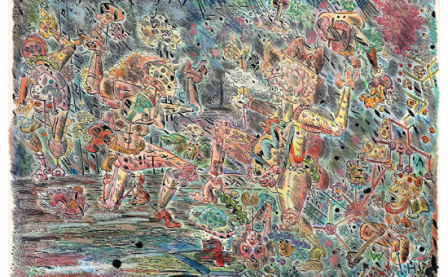Dear Cass,
How are you? I’ve been meaning to get in touch. I only know you from your songs, which I guess is less and more than anything else. I’ve been listening to Tip of The Sphere every day for a few weeks now, and, like the other records, its magic is revealed in increments. I’ve often thought of song as a sort of channeling, a ghostly union with eternal spirit, with disincarnate character-elementals. But when I listen to an album from another angle, an equal impression is revealed: an architecture that is, while spiritual, also a plain labor. Maybe that should have been obvious from the beginning; it’s been a while since I played music, and one can forget the physicality of the practice.
In the craft of the song is the revelation of the song’s eternity? These things, the ineffable temper of the song (of the poem or the film, &c) and the earthly made-ness of the art, are the same. But that’s like “of course.” Is this so of any labor? It’s a curse to say anything isn’t capable of being an altar. We aren’t just working for nothing. Well, OK, it usually feels that way. Thus, the pursuit of “truth” begins.
But maybe that’s all neither here nor there. It’s music — let it play. I was in Poictesme in the summer of 2016, when I was supposed to write a response to Mangy Love. I had thought of doing something kind of like what I’m doing now. I thought I’d say, “Dear Cass,” then go on to write about the album. That’s the flaw of introducing the epistle into “music criticism.” The audience, the readers of Tiny Mix Tapes I mean, probably want this review to give some sort of reasonable summation of the album’s merits, and all I feel able to do is ramble on like this into the air within which I imagine the creator of these songs. But I can think of no other way of interacting with a body of work so dear to me. Let’s try a compromise, all…
A while back, inspired by the poet Clark Coolidge’s “For Kurt Cobain,” I wrote a poem called “For Cass McCombs.” Maybe I wanted to open the psychic bridge a little. Maybe I was searching for my analogue to Coolidge’s Cobain.
There’s a line from the Coolidge poem, I used it as an epigraph: “How much further do we get with this naming?”… It felt linked inextricably to the kinds of questions your songs tend to ask, or generate.
“What do you call yourself, if anything? I do not care to call myself much of anything…”
Tip of The Sphere, and I might be wrong, seems to be an album of unity in isolation. Of the sadness of that predicament and of the power of that sadness. Of the nameless — though sometimes the nameless are named, aren’t they? Most of the album’s characters are somehow screwed into a lonely life. I see the chilly walker in “Absentee” or the drifter Hermes (“If I had your dollar…”) in “I Followed The River South to What” as instances of identifying that momentary “Tip” of the “Sphere” — like how, neo-proverbially, any one person is the center of the universe when observed, if the universe is infinite (though they say it isn’t these days).
Loneliness kills. It kills the sufferer, and as we have seen in this world lately and forever, it claims other adjacent victims. For a while, it can inspire deeply or balm anger, but loneliness always gets its due in the end. Like we’re all sleeping volcanoes and our eruptions, our isolated pressures, don’t have isolated effects. It’ll be helter skelter all over the world. Is there salvation in the old ways when the new ways are killing us? Is Romance the demiurge?
If I’ve heard a lonelier song than “Sidewalk Bop After Suicide,” I can’t bring it to mind. Everyone in Tip of The Sphere is on the edge of some kind of destitution, seeking a connection or to feel RIGHT. I want a day like today, but not today, you sing in “Prayer for Another Day,” and I think that’s right: not utopian, an appropriate hope, an apt spell. Although not overtly political (as in, dealing with the current political noösphere), this album feels somehow more appropriate to our connection-isolation than an album of straightforward protest could.
An album where cash is both golden ticket/activating talisman (“I Followed The River…”) and straight-up sacred trash (“American Canyon Sutra”) is an honest album, I think. And I appreciate honesty. Well — within reason. Mundus vult decipi, after all.
The elusive details in the songs here are what bring me back, haunted. I think, “Was that really there, or am I misremembering, hallucinating, the songs?” But it was there: that chiming coda in “Real Life,” the asynchronous layers of voice and electronics in “American Canyon Sutra,” the melody at the end of “Estrella” sung in Spanish, “Rounder” in its entirety, its cut-up neologisms. There are subtler practices going on here. It’s kind of you to bury and to decorate thus.
Anyway, again, thanks for the music. It’s great for thinking on. There’s more I’d like to say about the album, about everything, but this is a public forum and my time has run out. Let’s get a drink sometime.
Yours,
Ben
The Pit of The Damned, Penn.
Feb. 2019
More about: Cass McCombs




